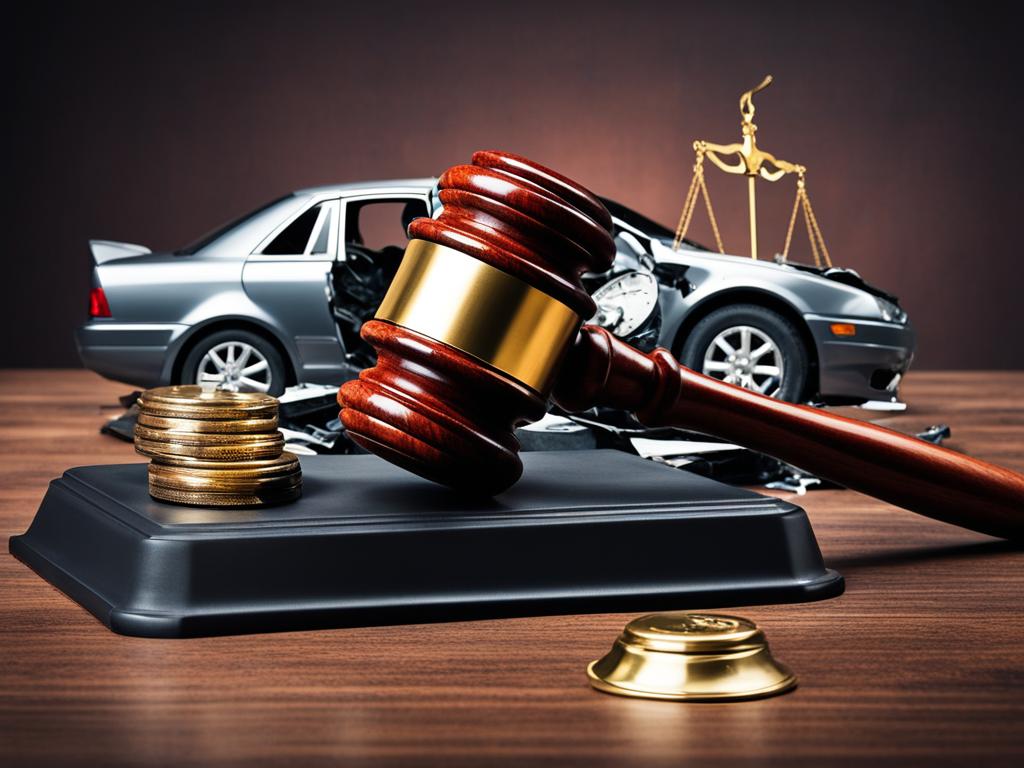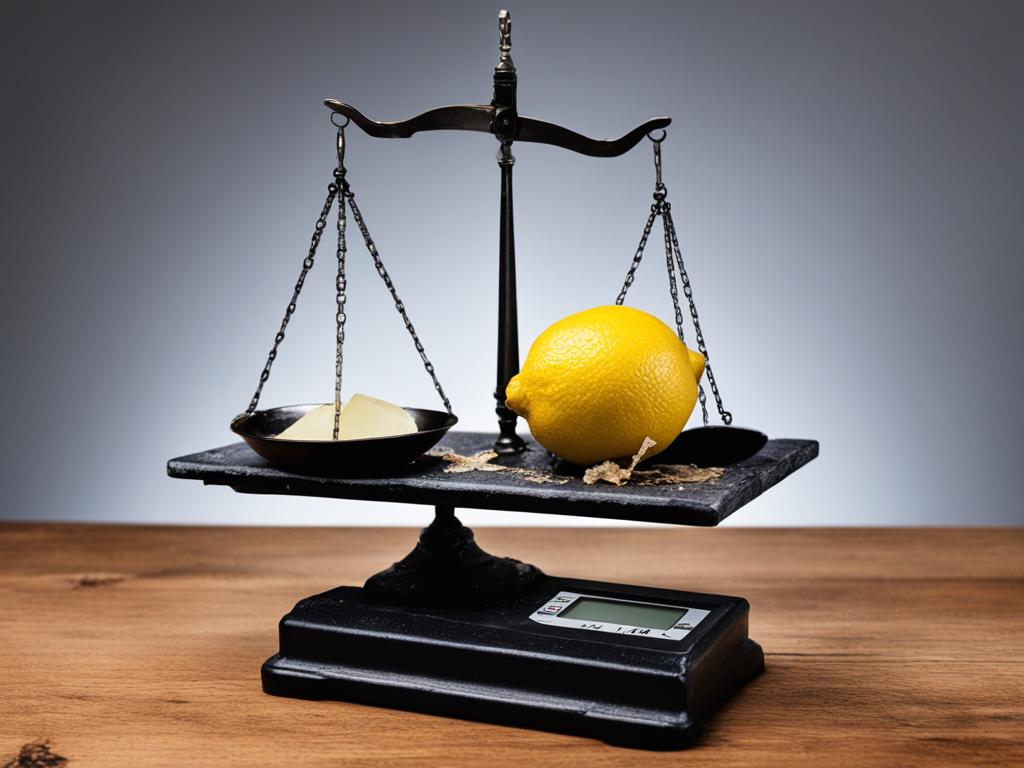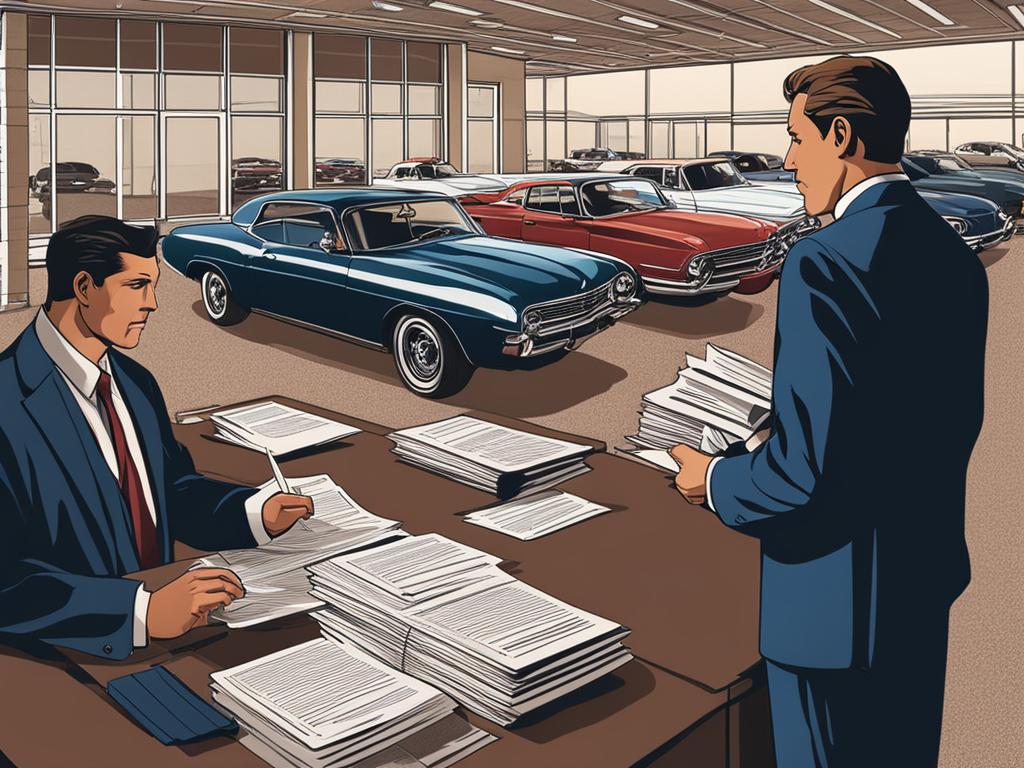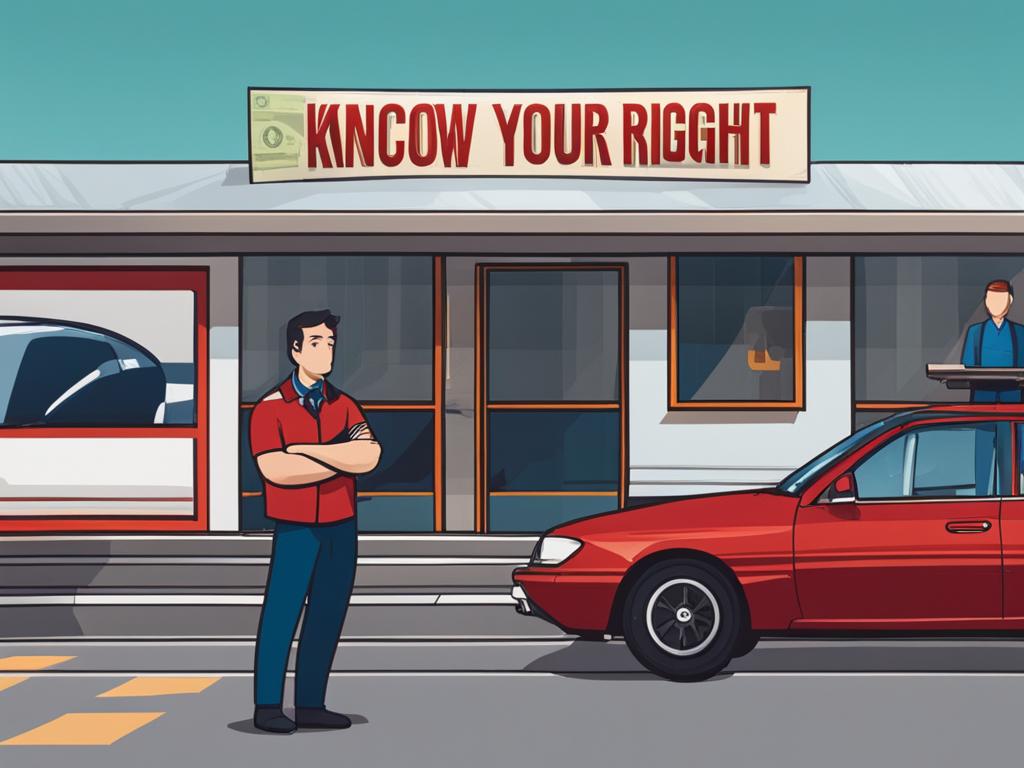Suing a Dealership for Negligence: Know Your Rights
Car buyers in the United States, especially in California, should be aware of their legal rights when it comes to dealing with car dealerships. Instances of negligence can arise from a variety of situations, including vehicle purchases, warranty refunds, or title issues. Consumers who find themselves in disputes with car dealerships due to negligence have the right to take legal action against the car dealership, including suing in small claims court. This article aims to provide essential information for individuals considering a car dealership negligence lawsuit.
Key Takeaways
- Understand the common types of small claims lawsuits against car dealerships.
- Recognize negligence in car sales and repairs, such as misrepresentation and omission of critical information.
- Familiarize yourself with state-specific consumer protection laws and FTC regulations that impact car dealership operations.
- Know how to gather evidence and calculate damages for a negligence lawsuit against a car dealership.
- Learn the pre-litigation steps, such as sending a demand letter, filing a DMV complaint, and negotiating with the dealership.
- Discover how to navigate small claims court and understand the role of Lemon Laws in negligence lawsuits.
- Acknowledge the differences between suing a dealership and a private seller, as well as advocating for fair compensation.
Recognizing Car Dealership Negligence
A car dealership may demonstrate negligence by breaching the standard of care during the sales process or vehicle repairs, causing harm or financial loss to the customer. This section will explore common forms of negligence in car dealership operations, the identification of defective or damaged vehicle sales, and the impact of misrepresentation and omissions by the dealership.
What Constitutes Negligence in Car Sales and Repairs
Car dealership negligence can take various forms, such as selling a vehicle with hidden mechanical issues, failing to perform safety checks, or providing false information about the vehicle’s condition. Other examples include mishandling repairs, not properly diagnosing vehicle issues, and improperly installing replacement parts.
Identifying Defective or Damaged Vehicle Sales
Dealerships are responsible for ensuring their vehicles meet safety standards and function as intended, which is known as the “standard of care” in legal terms. An essential step in identifying dealership negligence is recognizing when a dealership has breached this standard. Signs of a breach may include insufficient maintenance, omission of defects from vehicle history reports, and failure to disclose prior accidents that have compromised the structural integrity of the car.
Misrepresentation and Omissions by the Dealership
Misrepresentation refers to the dealership providing false or misleading information about a vehicle. This can include exaggerating the condition or performance of the vehicle, lying about its accident history, or providing false documentation. Omissions occur when important information about the car is deliberately not disclosed, making it difficult for the buyer to make an informed decision. Both misrepresentation and omission can lead to legal grounds for a lawsuit against the dealership, potentially resulting in car dealership negligence compensation for the affected customer.
| Type of Negligence | Examples |
|---|---|
| Selling defective or damaged vehicles | Failure to disclose prior accidents, hidden mechanical issues, manipulation of odometer readings |
| Misrepresentation | Providing false vehicle condition information, lying about accident history, exaggerating vehicle performance |
| Omissions | Withholding crucial information about the vehicle’s history, not disclosing known defects or issues |
By recognizing the signs of negligence in a car dealership’s sales and repair processes, customers can better protect themselves and potentially pursue legal action, such as suing the dealership for negligence, if they believe they have been wronged.
The Legal Basis for Suing Car Dealerships
In a negligence lawsuit against a car dealership, it is crucial to understand the legal framework that enables individuals to take legal action against dealerships. State-specific consumer protection laws, breaches of warranty and fraud, as well as regulations imposed by the Federal Trade Commission (FTC) all play a significant role in forming a valid basis for a claim.
State-Specific Consumer Protection Laws
States have established various consumer protection laws specific to car dealership negligence claims. For instance, California has implemented the DMV Car Buyer’s Bill of Rights, which requires mandatory disclosure of certain information by dealerships and also provides the option for contract cancellation on used car purchases. These consumer protection laws vary by state and lay the foundation for legal action against car dealerships engaging in negligent practices.
Understanding Breach of Warranty and Fraud
Breach of warranty and fraud are two common grounds for launching a negligence lawsuit against a car dealership. Breach of warranty occurs when a dealership fails to honor warranty repairs, while fraud entails false advertising or other misleading behaviors in the course of business. These legal concepts constitute significant elements of car dealership negligence claims, enabling consumers to hold dealerships accountable for any damages incurred.
FTC Regulations Impacting Car Dealership Operations
The Federal Trade Commission plays an important role in regulating the car industry, with specific focus on preventing deceptive business practices. FTC rules protect consumers from unethical tactics employed by car dealerships, and violations of these regulations could form the basis for a negligence lawsuit. Being aware of the FTC regulations applicable to car dealership operations is vital in determining the legal grounds to pursue a lawsuit.

Gathering Evidence for Your Negligence Lawsuit
To build a strong case when suing a dealership for a car accident caused by negligence, it’s crucial to gather substantial evidence that supports the claim. This includes a clear documentation of your experience with the dealership, service records and sales documents, and expert testimonies to establish the dealership’s negligence in selling a defective car or failing to provide promised services.
Documenting Your Experience with the Dealership
It is essential to keep a detailed record of your interactions and correspondence with the dealership. This includes emails, texts, and any other communication regarding the purchase, repair, or other services provided by the dealership. Dates and times are crucial, as they can help establish a timeline of events connected to the negligence case.
Compiling Service Records and Sale Documents
Obtaining copies of relevant service records, sales contracts, warranty information, and any other documents related to the vehicle is vital for your legal action against the car dealership. These documents can serve as strong evidence to support the claim of negligence and help determine the damages to be sought in the lawsuit.
Securing Expert Testimonies on Vehicle Defects
Seeking the opinion of an expert, such as a certified mechanic or automotive engineer, can significantly strengthen your case. These experts can testify about the nature of the vehicle defects, their causes, and if the dealership should have known about or disclosed these issues. Securing a detailed expert testimony can provide valuable insights and increase the odds of a successful negligence lawsuit against the car dealership.
In conclusion, gathering comprehensive evidence is critical for a negligence lawsuit against a car dealership related to car accidents. Meticulously documenting your experience, compiling relevant records and documents, and securing expert testimonies are essential steps in building a solid case and seeking justice for the damages incurred.
Calculating Damages in Car Dealership Negligence Claims
When seeking compensation in a car dealership negligence lawsuit, it’s essential to calculate the damages accurately and take into consideration various factors that contribute to the financial loss. In this section, we will guide you through the process of quantifying repair costs and loss of value, assessing the impact of fraudulent misrepresentation, and seeking compensation for emotional distress and ancillary expenses.

Quantifying Repair Costs and Loss of Value
One of the primary components of car dealership negligence compensation is the cost of repairs required to fix the issues caused by the negligence. This includes the cost of parts and labor required for the repair process. Additionally, the loss of value due to dealership negligence should be considered. This may refer to the difference in the market value of the vehicle before and after the negligence was discovered.
Assessing the Impact of Fraudulent Misrepresentation
Fraudulent misrepresentation plays a significant role in suing a car dealership for negligence. It occurs when the dealership knowingly provides false information or omits essential details, leading the buyer to purchase a vehicle that is not up to the standards claimed by the dealer. The impact of fraudulent misrepresentation can be assessed by determining the cost difference between the actual value of the vehicle and the value it would have had if the misrepresented information was accurate.
Seeking Compensation for Emotional Distress and Ancillary Expenses
In some cases, claimants may seek compensation for emotional distress caused by the dealership’s negligence. This includes the stress, anxiety, and frustration experienced due to the negligence and the resulting damages. Ancillary expenses, such as the cost of renting a car or using alternative transportation during the time required to address the negligence issue, can also be factored into the compensation claims. To ensure the most accurate calculation, it is crucial to document all expenses and emotional distress endured as a result of the negligence.
| Type of Damage | Description | Examples of Documentation |
|---|---|---|
| Repair Costs and Loss of Value | Cost of repairing issues caused by negligence and the loss of market value due to negligence. | Repair invoices, quotes for repairs, market value estimations. |
| Fraudulent Misrepresentation | Financial loss due to false information or omissions made by the dealership. | Proof of false claims, vehicle history reports, third-party valuations. |
| Emotional Distress and Ancillary Expenses | Stress and anxiety resulting from negligence and related out-of-pocket expenses. | Personal documentation of emotional distress, receipts for rental cars or alternative transportation. |
Pre-Litigation Steps: Demand Letters and DMV Complaints
Before pursuing a negligence claim against a car dealership, taking pre-litigation steps such as sending a demand letter, filing a complaint with the state DMV, and engaging in negotiations can potentially save time and money while resolving the dispute outside the courtroom. These efforts can help establish a solid foundation for your case should legal proceedings become necessary.
Utilizing Demand Letters to Communicate Grievances
Sending a demand letter to the dealership is an effective way of clearly communicating your concerns and seeking resolution. This letter should outline the specifics of your case, including the grounds for your car dealership negligence claims, the requested remedy (e.g., refunds, repairs), and a deadline for a response. A well-written demand letter not only demonstrates your seriousness but can also serve as valuable evidence in the event of a lawsuit.
Filing a Complaint with the State DMV
In cases involving warranties and titles, filing a formal complaint with the state Department of Motor Vehicles may aid in resolving the dispute. To strengthen your case, compile an evidence packet supporting your suing dealership for negligence claim and submit it alongside your complaint. Keep in mind that each state has its regulations and deadlines for filing DMV complaints, so research your state’s specific requirements.
Engaging in Negotiations with the Dealership
Negotiating with the dealership can provide an opportunity to reach a mutually satisfactory resolution without resorting to litigation. Express your willingness to negotiate and work towards an agreement that addresses your grievances. Should negotiations fail, you will have demonstrated good faith to the court, boosting the credibility of your claim.
By undertaking these pre-litigation measures, you may be able to resolve disputes without the need for a lawsuit. Should legal action become necessary, these steps will contribute to a robust foundation for your case, increasing the likelihood of a favorable outcome.
Suing Car Dealership for Negligence
When considering suing a car dealership for negligence, it is crucial to demonstrate that the dealership breached their duty of care, causing harm or financial loss. Identifying the correct legal entity and following appropriate legal procedures is essential in pursuing a negligence lawsuit against the car dealership.

- Serving a demand letter
- Filing a small claims lawsuit
- Preparing the appropriate court documents
- Notifying the defendant
Taking legal action enables consumers to seek justice and compensation for damages caused by dealership negligence. Familiarizing yourself with the typical stages of a negligence lawsuit can help streamline the process and enhance your chances of success.
| Stage | Description |
|---|---|
| 1. Sending a Demand Letter | Formally communicate your grievances with the dealership and request compensation or corrective action. |
| 2. Filing a Small Claims Lawsuit | Initiate legal action by filing a complaint with the appropriate court along with all necessary documentation. |
| 3. Serving Court Documents | Notify the dealership of the lawsuit by serving them the required documents as per the local court rules. |
| 4. Preparing for Court | Gather all relevant evidence, such as service records and expert opinions, to support your negligence claims. |
| 5. Court Appearance | Present your case before the judge, backed by strong evidence and coherent arguments, to prove dealership negligence. |
| 6. Court Decision | Obtain the judge’s ruling on the case, which may include compensation or other remedies as deemed appropriate. |
Although the process of suing a car dealership for negligence may seem intimidating, it is a crucial step in holding dealerships accountable for their actions and securing justice for consumers who have suffered due to their negligence.
Navigating Small Claims Court for Auto Dealership Issues
Small claims court provides an efficient avenue for individuals seeking to address disputes with car dealerships, like negligence cases. Understanding how to properly file a claim and prepare for the hearing is crucial to the process. Key steps such as completing the necessary forms, serving the appropriate documents, and organizing evidence will bolster the chances of success in a small claims case.
Filing the Claim: Procedure and Paperwork
Filing a negligence lawsuit in small claims court entails completing a Plaintiff’s Claim, including the accurate information of both parties and a detailed account of the grievance. Ensure that the proper legal entity of the dealership is identified to avoid any complications during the trial. Thorough documentation of interactions, contracts, receipts, and service records will substantiate your claim.
Understanding Serving Requirements and Fees
It is crucial to consider the serving requirements for notifying the defendant. Typically, this involves enlisting a third party such as a process server or a Sheriff’s Department to deliver a copy of the Plaintiff’s Claim to the dealership. Be prepared to cover the associated fees and file proof of service, as failure to serve the required documents correctly may result in a dismissal of the lawsuit.

Preparing for the Hearing: Evidence and Arguments
Adequate preparation for the small claims court hearing is essential. Compile all relevant documentary evidence supporting your claim, such as photographs, expert reports, and written testimonies. Organize your argument in a logical and concise manner, outlining how the dealership was negligent and the resulting financial damages incurred.
| Evidence Type | Description | Role in Case |
|---|---|---|
| Documentary Evidence | Contracts, receipts, service records, and warranty information. | Establish the terms of the agreement and dealership’s responsibilities. |
| Photographic Evidence | Images that demonstrate the vehicle’s condition or defects. | Visual proof of the dealership’s negligence and the resulting damage. |
| Expert Reports | Statements from mechanics or other specialists who have assessed the vehicle. | Reinforce your claim by providing professional opinions on the negligence. |
| Written Testimonies | Statements from witnesses who can corroborate aspects of your claim. | Support your allegations and provide additional credibility to your case. |
Taking legal action through small claims court provides a streamlined process for suing a car dealership for negligence. By gathering the appropriate evidence, understanding the procedural requirements, and presenting a strong case, consumers can seek compensation for damages arising from dealership negligence.
The Role of Lemon Laws in Negligence Lawsuits
Lemon laws often come into play when considering negligence lawsuits, as they protect consumers from unrepairable vehicle defects. These laws vary by state and can apply to both new and used cars. Understanding the specifics of Lemon Legislation in your state is crucial to your legal approach, whether you’re suing a dealership for car accidents caused by negligence or dealing with the negligence of a car dealership in other aspects.

Are You Eligible for Lemon Law Protections?
Eligibility for Lemon Law protections depends on the circumstances of your case, such as the type of vehicle and the nature of the defects. If the vehicle has been in the repair shop multiple times or has been unrepairable for a specified period, Lemon Law protections may be relevant. These factors can shape the strategy of your negligence lawsuit against the dealership.
Interpreting Lemon Legislation in Different States
Each state has its Lemon Legislation, with specific regulations and guidelines on vehicle types, repair attempts, and time periods that qualify for protections. Some states offer a broader scope of protections, while others may be more limited. Be sure to research and understand the Lemon Laws applicable in your state, as they will affect your legal options when seeking compensation for dealership negligence.
If the vehicle has been in the repair shop multiple times or has been unrepairable for a specified period, Lemon Law protections may be relevant.
Alternatives to Lawsuits: State Arbitration Programs
In some cases, state-sponsored arbitration programs provide an alternative to litigation for resolving issues with defective vehicles. These programs offer a more streamlined process for dispute resolution and often work in tandem with Lemon Laws. Consumers who choose arbitration may avoid a lengthy and costly lawsuit while still seeking justice and compensation for their financial losses caused by a negligent dealership.
| Advantages of Lemon Law Arbitration | Disadvantages of Lemon Law Arbitration |
|---|---|
| Streamlined process | Outcomes may be less favorable than litigation |
| Lower costs than litigation | Binding decisions, limited options for appealing |
| Faster resolution of disputes | May require compromise on demands |
It is vital to consider all available legal options, including state-specific Lemon Laws and arbitration programs, to develop the most effective strategy for your negligence lawsuit against a car dealership.
Suing a Dealership vs. Private Sellers: Key Differences
When pursuing legal action for car-related issues, it’s essential to understand the significant differences between suing a car dealership for negligence and suing a private seller.

Dealerships are subject to strict consumer protection laws, such as the California DMV Car Buyer’s Bill of Rights, which requires specific disclosures and provides customers with the option to cancel used car purchase contracts under certain conditions. In contrast, private sellers often sell cars as-is, without the protections provided by warranties or consumer protection laws. Thus, the legal avenues and consumer protections available to you may vary significantly, as dealerships are often held to a higher standard of accountability.
Table: Key Differences Between Suing Car Dealerships and Private Sellers
| Characteristic | Car Dealerships | Private Sellers |
|---|---|---|
| Consumer Protection Laws | Subject to strict state and federal laws, such as the California DMV Car Buyer’s Bill of Rights and the Federal Trade Commission’s regulations. | Not subject to the same level of regulation as dealerships; generally sell cars as-is without warranty protection. |
| Warranties | Possibility for warranty coverage; higher accountability and obligation to honor warranty repairs. | Less likely to offer warranties; may not be held responsible for defects or required repairs. |
| Legal Remedies | May be pursued for damages caused by breach of warranty, fraudulent misrepresentations, and failure to provide promised services. | Limited avenues for pursuing damages; often entail lower chances of success in court. |
Being aware of these differences can help you evaluate your options and choose the appropriate course of action when seeking compensation for negligence or misconduct in the purchase and repair of your car. Regardless of the party you choose to sue, it is crucial to consult with an attorney specializing in consumer protection and dealership negligence to assess your case and devise the most effective legal strategy.
Advocating for Fair Compensation from Car Dealerships
When seeking compensation for car dealership negligence, it is vital to understand the various factors that courts and settlement negotiations consider. This knowledge can help you effectively advocate for fair remedies in your car dealership negligence claims.

How Courts Calculate Fair Remedies
The determination of fair compensation in car dealership negligence cases typically involves examining actual monetary damages, such as repair costs and the diminished value of the vehicle. Courts may also consider potential punitive awards, as well as the impact of the dealership’s fraudulent practices on the overall worth of the car.
Winning Settlements Outside of Court
Settlement negotiations can offer an alternative route to resolving car dealership negligence claims without going to court. By engaging in constructive dialogues, parties may reach mutually acceptable agreements on essential issues such as compensation amounts, repair obligations, or warranty extensions. Successful negotiation can lead to more efficient resolutions and reduce legal fees on both sides.
Impact of Legal Precedents on Compensation Amounts
Legal precedents set in previous cases involving similar car dealership negligence claims can significantly influence the compensation awarded in your case. Understanding and referencing prior case outcomes can provide valuable insights into appropriate settlement amounts and strengthen your negotiation position. By staying informed and strategically using pertinent legal precedents, you can better advocate for fair compensation in your car dealership negligence claims.
Conclusion
Taking legal action against a car dealership for negligence can seem like a daunting task. However, understanding your rights and adhering to the proper legal procedures can lead to a favorable outcome in a negligence lawsuit against a car dealership. By thoroughly documenting all evidence and effectively navigating the legal system, individuals can hold dealerships accountable for any wrongdoing and seek restitution for their losses.
It is essential to be well-versed in various consumer protection laws, both on a federal level and within your specific state. Adequate knowledge of these laws can greatly impact the success of your negligence claim. Moreover, being aware of legal precedents set by similar cases and the potential compensation awarded in negligence claims can help guide expectations and demands during negotiations or court proceedings.
In conclusion, if you believe you have been wronged by a car dealership, do not shy away from taking appropriate legal action. With adequate preparation, a thorough understanding of consumer protection laws, and diligent documentation of evidence, you are taking the right steps toward holding negligent dealerships accountable and claiming the compensation you deserve.
FAQ
What constitutes negligence in car sales and repairs?
Negligence in car dealership operations can include selling a vehicle with hidden mechanical issues, making fraudulent misrepresentations about a vehicle’s history, or omitting critical information during a sale. Breaching the standard of care, such as not conducting safety checks or providing false vehicle conditions, constitutes negligence in car sales and repairs.
How can I identify a defective or damaged vehicle sale?
To identify a defective or damaged vehicle sale, look for evidence of hidden mechanical issues, undisclosed accident history, or odometer discrepancies. Additionally, securing expert testimonies on vehicle defects and reviewing service records can help uncover any defective or damaged vehicle sales.
What are the state-specific consumer protection laws that apply to car dealership negligence claims?
State-specific consumer protection laws vary but may include laws like the California DMV Car Buyer’s Bill of Rights, which mandates dealership disclosures and the option for contract cancellation on used car purchases. It is important to research and understand your state’s specific consumer protection laws that apply to car dealership negligence claims.
How can I gather evidence for my negligence lawsuit against a car dealership?
To gather evidence for your negligence lawsuit, document your interactions with the dealership, compile service records, sales documents, warranty information, and secure expert testimonies on vehicle defects. Meticulously organizing your evidence is key to establishing dealership negligence.
What should I consider before suing a car dealership for negligence?
Before suing a car dealership for negligence, consider sending a demand letter outlining your requests and filing a formal complaint with the state DMV. Engage in negotiations with the dealership, as it may provide an opportunity to reach an out-of-court settlement. Ensure you have strong evidence proving the dealership breached its duty of care and caused harm or financial loss.
What is the role of Lemon Laws in negligence lawsuits?
Lemon Laws protect consumers from vehicles with unrepairable defects. These laws vary by state and may apply to both new and used cars. If you are eligible for Lemon Law protections, your legal strategy may differ, as arbitration may be a suitable alternative to litigation. Understanding your state’s specific Lemon Legislation is essential in navigating negligence lawsuits.
How are damages calculated in car dealership negligence claims?
Damages are calculated based on repair costs, diminished value of the vehicle, and the impact of any misrepresented information on the vehicle’s worth. Claimants may also seek compensation for emotional distress and related out-of-pocket expenses incurred due to the dealership’s negligence.
What are the key differences between suing a dealership and a private seller for car issues?
Dealerships are subject to strict consumer protection laws and may offer warranties, while private sellers commonly sell cars as-is. Legal avenues and consumer protections available may differ, with dealerships often held to a higher standard of accountability than private sellers.




